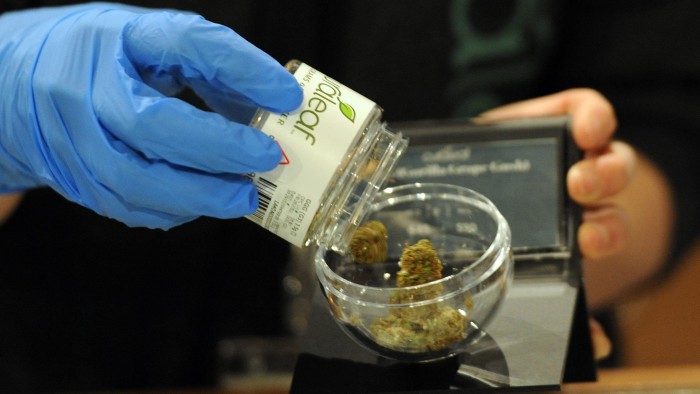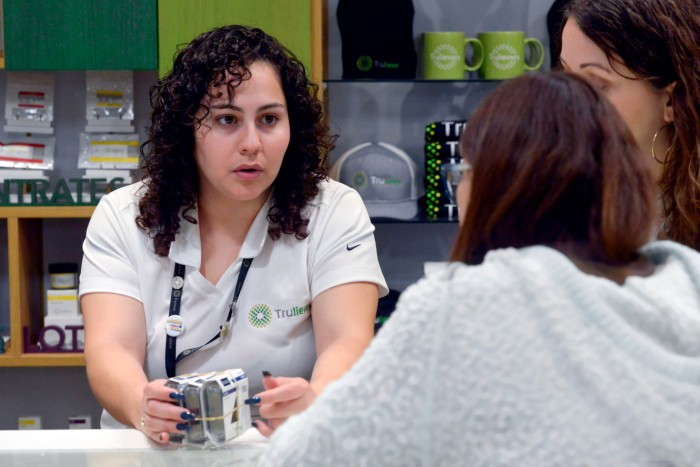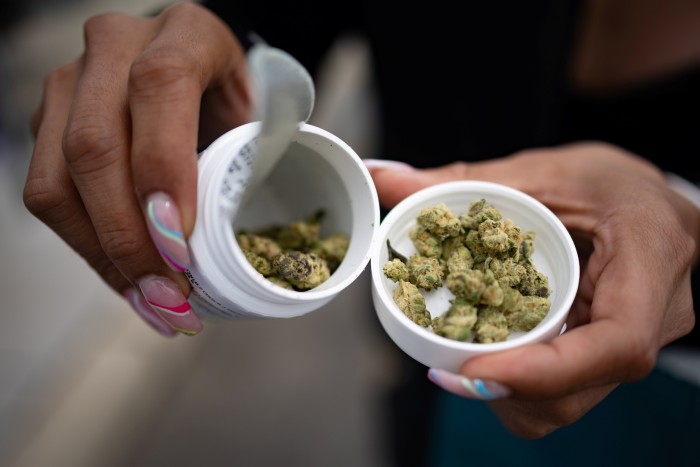Cannabis companies proliferate on list of fastest-growing American businesses

Roula Khalaf, Editor of the FT, selects her favourite stories in this weekly newsletter.
Missouri’s cannabis dispensaries received a pleasant surprise on February 3.
A few days earlier than planned, the US state began approving permits to sell recreational marijuana. Long queues quickly formed outside some of the 200-odd approved dispensaries and, since then, Missourians have spent nearly $230mn on cannabis products.
Now, the state is projected to be the fastest to reach $1bn in sales, having become the 21st to legalise recreational weed following a referendum last year. For entrepreneurs and investors who are bullish about the cannabis industry, Missouri is yet another compelling example of the sector’s upside potential.
That potential is also captured in this year’s FT ranking of the 500 fastest-growing companies in the Americas. Some 11 cannabis companies made this year’s list, compared with just one last year and none in 2021.
The companies recorded compound annual growth rates ranging from 21 to 175 per cent between 2018 to 2021, and two were closing in on $1bn in sales.
Yet the big players in the market also have to contend with poor brand loyalty and intense competition from independent dispensaries and the illicit market, as well as regulatory obstacles.
As Cresco’s founder Charlie Bachtell puts it, there is a $75bn industry “in the shadows” — the illicit marijuana market — that “we can convert . . . to come over to the regulated market in a pretty short period of time”.
“It’s a really beautiful opportunity,” he says. “Really, all you need to do is match the quality, the availability and the price of what [the illicit market] is currently doing.” Cresco’s revenues were $843mn last year.

If states continue giving the green light to recreational cannabis at the current pace, analytics company New Frontier Data projects that the legal cannabis sector will more than double from $30bn in sales last year to $71bn by the end of the decade. Maryland is set to become the next US state to legalise recreational cannabis in July, and Oklahoma and Ohio are considering similar changes this year.
“Growth in cannabis exists at every level,” says Kim Rivers, chief executive of Trulieve, which generated $1.2bn in sales from 181 dispensaries in 11 states last year. “We see new consumers discovering the category for the first time — Gen Z’ers and middle-aged women in particular, you’ve got growth at the state level as new states come online . . . and then, of course, at the federal level, we could see a massive change over the next five to 10 years.”
For the time being, however, the industry is still hamstrung by a multitude of challenges.
Pot is still illegal at a federal level — despite US President Joe Biden launching a review in October of marijuana’s status as a Schedule I drug, the same as heroin — meaning all supply chains must stay within state lines, creating huge inefficiencies for big businesses.
Moreover, major US banks and financial institutions still do not have the legal certainty to provide much-needed financing for cannabis companies. Legislation aimed at resolving that, the SAFE Banking Act, has been stuck in Congress since 2019, having passed the US House of Representatives seven times but floundered in the Senate.
“There’s a whole litany of reasons why this industry is just fundamentally challenged with over-competition and overregulation,” says Andrew Carter, a cannabis sector analyst at investment bank Stifel.
Most big companies, including Curaleaf and Trulieve, have struggled to become profitable, and their share prices are down compared with when they first listed on Canadian stock exchanges around the time that cannabis prohibition ended in 2018

In states such as California and Colorado, businesses have also had a “very difficult time” with a collapse in wholesale prices driven by “too much supply for the demand that was out there”, says Kyle Kazan, who runs California-based Glass House Group.
Bachtell accepts there was “a lot of hype and a lot of excitement without any proven concepts” in the early days of the legal cannabis industry when graphs on pitch books resembled “hockey sticks”.
But he argues that there are now several “fundamentally sound” cannabis businesses. “We have had this shift in what investors want to see, going from growth at all costs to responsible growth with operational cash flow,” Bachtell explains.

Nonetheless, the cannabis industry “still appeals as a high growth sector”, according to Jonathan DeCourcey, an analyst at investment bank BTIG. “While it could be choppy and it is difficult to invest in a space that will continue to be fairly unpredictable, until federal legalisation arrives, there aren’t many industries with this much upside.”
However, the majority of big recent investments from consumer goods conglomerates in the cannabis industry have turned sour.
Cigarette company Altria paid $1.8bn in 2019 for a 45 per cent stake in Canadian cannabis producer Cronos, which has since lost more than 75 per cent of its value. Last year, the Marlboro maker abandoned a warrant to acquire additional shares.
Corona beer maker Constellation Brands also recently recorded a $1.1bn writedown on a 38 per cent stake in cannabis company Canopy Growth, which it took in 2020.
Stifel’s Carter predicts that there will be plenty more reorganisation and consolidation in the industry in the years to come as minimal loyalty to existing brands means companies will continue to come and go.
Cresco Labs, for instance, is currently merging with its competitor Columbia Care.
“Imagine we’re sitting here at the turn of the century in the US and there’s 1,000 cereal companies out there — I don’t know who is going to be Cheerios and who isn’t,” points out Carter. “Investors are searching for the Cheerios of weed, but that’s not an easy task.”

Comments